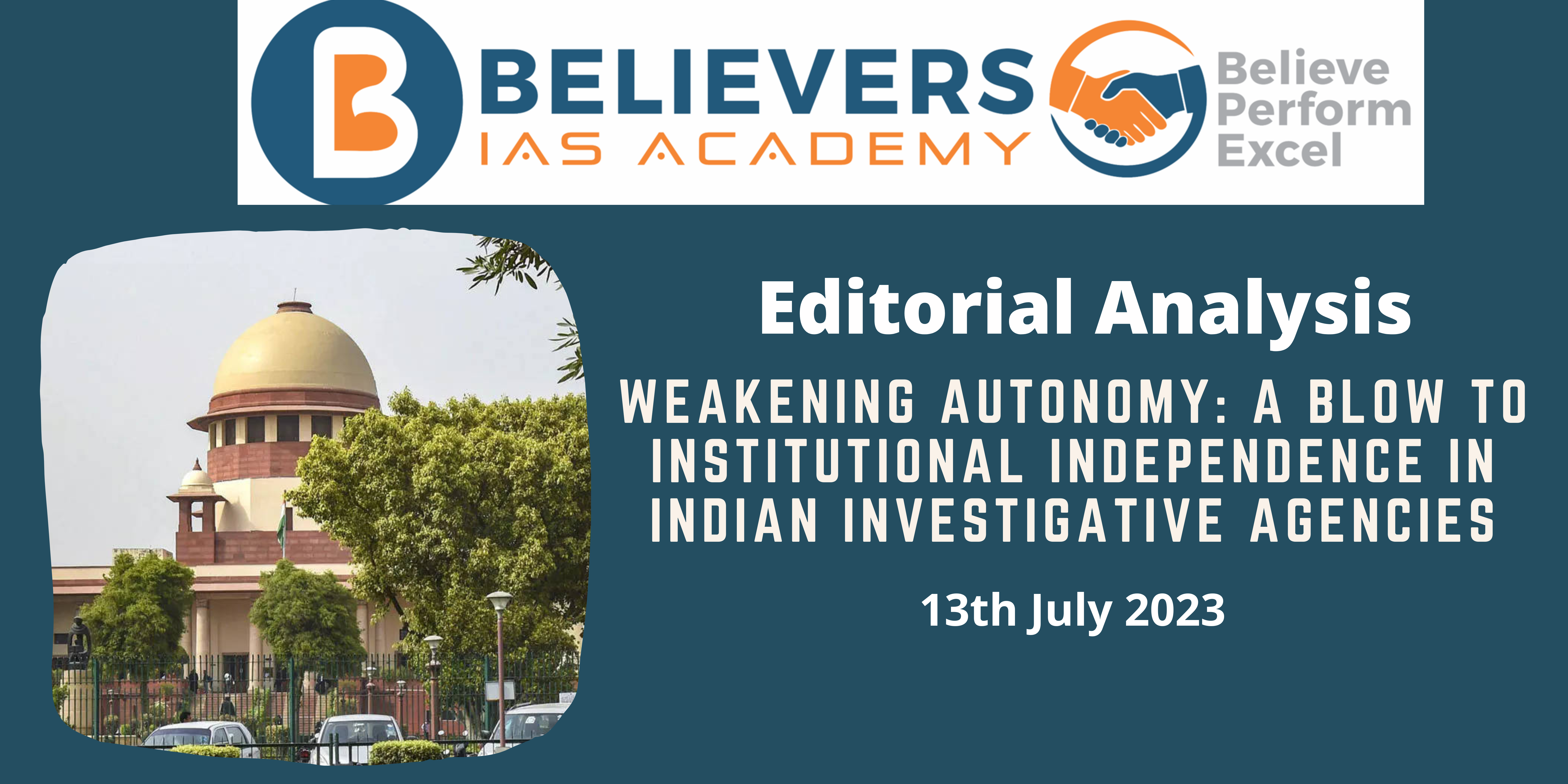Weakening Autonomy: A Blow to Institutional Independence in Indian Investigative Agencies
Introduction:
The recent Supreme Court verdict upholding the statutory amendments allowing multiple extensions of service to heads of investigative agencies has dealt a severe blow to their institutional independence. While the court’s decision to invalidate the two one-year extensions granted to the Director of Enforcement, S.K. Mishra, is a positive step, the overall judgment provides the government with a loophole to undermine the autonomy of these crucial agencies.
Relevance:
GS-02 (Indian Polity, Rule of law, Government Policies and Intervention, Judiciary)
Prelims:
- Directorate of Enforcement (ED)
- Money Laundering
- PMLA, FEMA
- Rule of Law
- Supreme Court
Mains Question:
- Critically analyze the Supreme Court’s verdict on the extensions of service to heads of investigative agencies and its impact on institutional independence. Discuss the implications of this judgment for the rule of law in India. (250 words)
Dimensions of the Article:
- The Verdict’s Dual Consequences
- Piecemeal Extensions and Institutional Independence
- Violation of Fundamental Rights and Impartial Investigation
The Verdict’s Dual Consequences
a) The Positive Aspect: Quashing of Two Extensions
- The Supreme Court’s decision to ask Mr. S.K. Mishra, the Director of Enforcement, to step down on July 31, effectively invalidating the two one-year extensions, is a welcome move. This action upholds the principle that extensions beyond the prescribed term should be rare and exceptional, safeguarding against undue prolongation of an individual’s tenure.
b) The Negative Aspect: Endorsement of Extended Terms
- The verdict also endorses the changes that enable annual extensions to the Central Bureau of Investigation (CBI) and Enforcement Directorate (ED) Directors until they complete five years in office.
- This development weakens the institutional autonomy of these agencies by creating a system that allows multiple extensions, potentially compromising their independence.
Piecemeal Extensions and Institutional Independence
a) Undermining the Office’s Independence
- The introduction of piecemeal extensions, as witnessed in the case of Mr. Mishra, raises concerns regarding the independence of these crucial offices.
- It establishes a carrot-and-stick policy that pressures Directors to align with the government’s agenda, potentially compromising their ability to function impartially and transparently.
b) Contradiction to Previous Judgments
- The court’s rejection, without substantial justification, of the contention that the 2021 amendments contradict earlier judgments mandating fixed tenures for CBI and ED heads is troubling.
- These amendments, including changes to the Central Vigilance Commission Act, the Delhi Special Police Establishment Act, and the Fundamental Rules, appear to deviate from the spirit of earlier decisions aimed at insulating investigative agencies from external pressures.
Violation of Fundamental Rights and Impartial Investigation
a) Ignoring the Citizens’ Rights
- The court’s surprising finding that the amendments do not infringe upon fundamental rights raises concerns about the right to equal treatment and impartial investigation.
- Allowing the government to appoint Directors who may selectively investigate cases based on political instructions undermines the citizens’ right to a fair and unbiased legal system.
b) Suspicions of Misuse and the Rule of Law
- At a time when doubts persist regarding the potential misuse of government agencies against political opponents, the court’s endorsement of a tenure extension system designed to undermine institutional independence poses a threat to the rule of law.
- The need to maintain public trust in the integrity and impartiality of investigative agencies cannot be understated.
Way Forward:
To restore and safeguard the autonomy of investigative agencies, several measures should be considered:
1. Implementing clear guidelines: Establish clear and transparent guidelines for appointments and extensions to the positions of CBI and ED Directors, ensuring adherence to fixed tenures and limiting extensions to truly exceptional circumstances.
2. Strengthening oversight mechanisms: Enhance the role of parliamentary committees and independent bodies in monitoring the functioning of investigative agencies, ensuring accountability and preventing undue political interference.
3. Public awareness and engagement: Foster public awareness about the importance of institutional independence and citizen engagement in demanding accountability from investigative agencies.
Conclusion:
The Supreme Court’s verdict, while striking down the extensions granted to the Director of Enforcement, falls short in safeguarding the institutional independence of investigative agencies. The endorsement of extended terms and the potential erosion of autonomy raise significant concerns about the impartiality and transparency of these crucial institutions. It is imperative for the government, judiciary, and citizens to work together to preserve the rule of law and protect the independence of investigative agencies from political pressures and interference.



